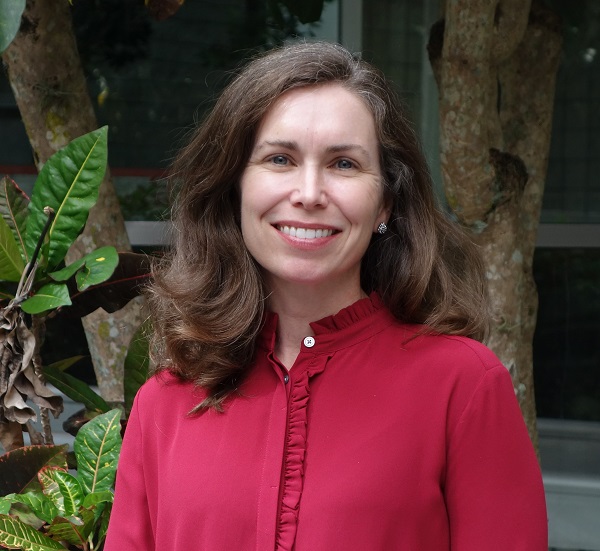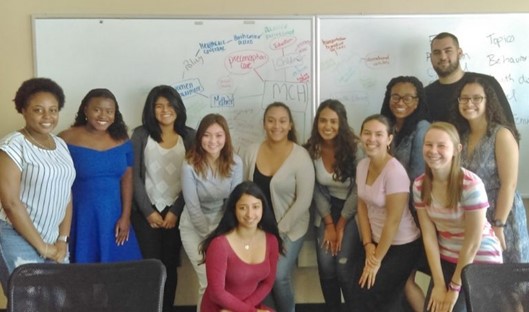Diversifying the maternal and child health workforce
A pipeline training program (PTP) is a step in the right direction toward diversifying the representation of professionals working in the field of maternal and child health (MCH), according to new research published by USF College of Public Health’s Dr. Anna Torrens Armstrong, associate professor.
In “An Overview of an Undergraduate Diversity MCH Pipeline Training Program: USF’s Train‑A‑Bull,” published in Maternal and Child Health Journal, Torrens Armstrong outlines how an undergraduate PTP designed to guide underrepresented minorities into MCH-related health professions will contribute to a diverse workforce that can “improve health outcomes for all women/mothers, children and their families, including fathers and children with special health care needs.”

The USF College of Public Health’s MCH Train-A-Bull program is a didactic, experiential, mentoring and peer exchange training program designed for undergraduate students from backgrounds that are economically and educationally disadvantaged as well as racially/ethnically diverse.
Originally funded by the Maternal and Child Health Bureau within the Health Resources and Services Administration, the program aims to increase the diversity of the MCH workforce by supporting scholars who seek graduate training in MCH and health-related fields.
Awardees of the training program receive academic, financial and other assistance.

“The research has demonstrated that diversity among the workforce in general is important. If your health care comes from someone who you can relate to, you are going to be more open and receptive to it. If MCH policies are written by people who understand your lived experiences, those policies are going to be more reflective of them,” Torrens Armstrong said.
At time of publication, the MCH Train-A-Bull program had mentored 35 students, with 51.4 percent of them being first-generation college students and 74.3 percent coming from economic hardships (such as using a PELL grant or FAFSA). A third of those students ultimately enrolled in health-related graduate studies and half joined the MCH workforce, according to Torrens Armstrong.
“There are very few articles written that document pathway programs specifically in the field of MCH,” Torrens Armstrong said. “The dissemination of the outcomes from MCH diversity pathway training programs contribute to the knowledge and evidence base of best practices for future programs to consider.”
For Armstrong, this PTP program highlights the impact of mentorship.
“We are not all at the same place when it comes to making decisions about our educational pathway, so when a program can be intentional and take this into consideration, it really helps in offering the right opportunities to meet students where they are at that point in time,” she said.

“My favorite experience [was] participating in the Title V internship program at the Tennessee Department of Health. Being able to learn how to conduct qualitative research at a state agency and improve women’s population health from a public health perspective have provided profound insight on my future career aspiration as a physician,” said Train-A-Bull scholar Jennifer Ming Yin Su, who graduated with her BS in biomedical sciences in 2021.

MPH alumna Chedeline Apollon, a first-generation college student, said the program helped connect her many “influential leaders in maternal and child health and their research.”
“Dr. Rachel Logan has been by far the most invaluable resource to me offered by the MCH Pipeline program. She has not only assisted me throughout my time in the USF BSPH program but, when I was accepted in the MPH program at USF, she continued to mentor me and is a mentor to me presently. I owe a large portion of my success to her and my connection to her was through this program,” Apollon said.
The USF Train-a-Bull program is soon to open applications for a new summer 2022 cohort. Interested students may complete a brief questionnaire to receive an application to apply.
“We are re-invigorating our program with a focus on social justice so that as we continue to build MCH scholars, we will do so with an intentional focus on the role of social justice in how we deliver curriculum, training and opportunities,” Torrens Armstrong said. “The goal is to develop scholars that not only reflect the populations they serve, but also have training to understand and address the roots of the health inequities we see in our nation among MCH populations.”
Torrens Armstrong also said the program will be rebranded as the MCH Scholars for Social Justice Undergraduate Pathway Program. Learn more about the program here.
Related research:
Success of Maternal and Child Health Pipeline Training Programs: Alumni Survey Results
Story by Anna Mayor, USF College of Public Health
